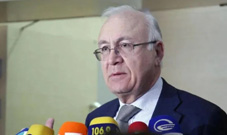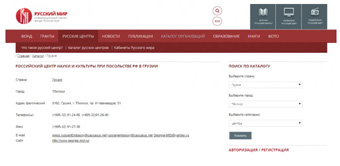
SOVA NEWS reports on opening of Russian Center for Culture and Science in Tbilisi
By Tsotne Pataraia
Friday, December 20
According to SOVA NEWS, a center for Russian culture and science has opened in Tbilisi, but Zurab Abashidze, Prime Minister's Special Representative for Relations with Russia, has not confirmed the information.
Abashidze denies reports about the opening of the Russian Cultural Center in Tbilisi:
“According to our information, no cultural center has been opened. You can check this information at the Embassy of Switzerland,” he said.
The Ministry of Foreign Affairs of Georgia has stated that they had checked the information at the Embassy of Switzerland in Tbilisi that did not confirm the information.
However, the website of the foundation Russian World, which runs these centers in different countries, indicates that the Russian Cultural Center in Tbilisi is located in the Russian Interests Department of the Embassy of Switzerland.
MP from European Georgia David Bakradze said he could not confirm whether the Russian Cultural Center in Georgia had been opened or not. However, he added, if that was the case, this would not be the first time that Georgian officials concealed such information. For example, he cited a meeting between Lavrov and Zalkaliani:
“I will not be surprised if that is true and Georgian government hides the information and we learn it from Russian sources. If this is true and if the center exists, I rule out the possibility that it happened without agreement with the Georgian government," said Bakradze.
Opening of the center was announced after the recent Abashidze-Karasin meeting (direct Geo-Rus bilateral dialogue on economic, cultural and social affairs) in Prague, the former deputy foreign minister of Russia, Senator Gregory Karasin, told the information to the Russian media.
Russian cultural centers have a long history that dates back to the Soviet Union. Zurab Abashidze himself was the head of the Presidium of a similar agency in Georgia in soviet times. Such centers are under the control of the Russian Foreign Ministry. Officially, they aim to deepen cultural relations between countries, including language learning, exchange courses and a series of public events such as film screenings, concerts and book presentations.
However, experience in many countries has shown that such centers are used as a cover for Russia's foreign intelligence work. The recent two heads of the Russian Cultural Center in the United States have officially been declared personae non gratae for spying by the FBI, one of them was included in Trump administration's expulsion in 2018 along with 59 people who were identified as spies.


